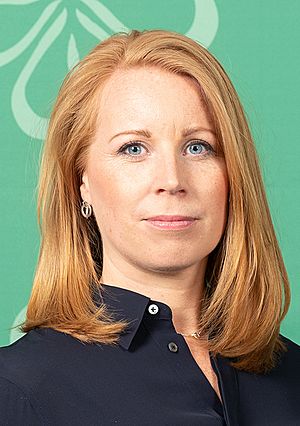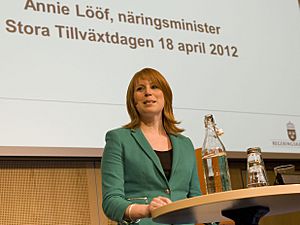Annie Lööf facts for kids
Quick facts for kids
Annie Lööf
C
|
|
|---|---|

Lööf in April 2019
|
|
| Leader of the Centre Party | |
| In office 23 September 2011 – 2 February 2023 |
|
| Party secretary | Michael Arthursson |
| Preceded by | Maud Olofsson |
| Succeeded by | Muharrem Demirok |
| Minister for Enterprise | |
| In office 29 September 2011 – 3 October 2014 |
|
| Prime Minister | Fredrik Reinfeldt |
| Preceded by | Maud Olofsson |
| Succeeded by | Mikael Damberg |
| Member of the Riksdag | |
| In office 17 September 2006 – 19 February 2023 |
|
| Constituency | Jönköping County |
| Personal details | |
| Born |
Annie Marie Therése Johansson
16 July 1983 Värnamo, Sweden |
| Political party | Centre |
| Spouse |
Carl-Johan Lööf
(m. 2011) |
| Children | 2 |
| Parent |
|
| Alma mater | Lund University (LL.M.) |
| Occupation | Politician |
Annie Marie Therése Lööf, born on July 16, 1983, is a Swedish politician and lawyer. She was a Member of the Riksdag (Sweden's parliament) from 2006 to 2023. Annie Lööf also led the Centre Party from September 2011 to February 2023. She served as Minister for Enterprise from 2011 to 2014 in the government led by Fredrik Reinfeldt.
Contents
Early Life and Education
Annie Lööf grew up in a small village called Maramö, near Värnamo, Sweden. While studying social sciences at Finnvedens Secondary School, she became very interested in politics.
Youth Activities
In her younger years, Annie Lööf was a soccer goalkeeper. She played for the women's team of IFK Värnamo. In 2001, she joined the Centre Party. The next year, she worked for the party's youth organization during the 2002 general election. She also won a scholarship that allowed her to learn about international peace and environmental issues at the UN Headquarters in New York.
Studying Law
After the election, Annie Lööf began studying law at Lund University. She earned her law degree in August 2011.
Political Journey
Becoming a Member of Parliament
In the 2006 general election, Annie Lööf was elected to the Riksdag. At that time, she was the youngest member of the Swedish parliament.
Key Roles in Parliament
In 2007, Annie Lööf helped start the Liberal Group. This group was a network for people who shared liberal ideas, both inside and outside the Riksdag. She also served as the vice president of the Centre Party Youth organization. For several years, she was on the board of the Nordic Centre Youth Federation.
Before becoming a minister and party leader, Annie Lööf held important roles. She was a member of the Committee on Finance and the War Delegation. She also served as a vice president of the Committee on Justice. She was also a deputy leader for the Centre Party's group in parliament.
Local Politics and Party Leadership
Annie Lööf was also active in local politics in Värnamo. She served on the City Council and the Citizens' Board. After the 2010 general election, she led a group that analyzed the Centre Party's performance. In 2011, she became the party's spokesperson for financial and economic affairs. On September 23, 2011, she was chosen as the leader of the Centre Party.
Leading the Centre Party
Annie Lööf became the leader of the Centre Party on September 23, 2011. She was the youngest person ever to lead the party.
Minister for Enterprise
On September 29, 2011, Annie Lööf also became the Minister for Enterprise. She took over this role from Maud Olofsson. As minister, she made some changes to the government. She brought in Lena Ek as the new Minister for the Environment. She also created a new position, Minister for IT and Energy, which Anna-Karin Hatt took on.
Challenges and Public Trust
In 2012, Annie Lööf spoke about the government's need to make more changes. This led to some disagreements with other parties in the government. She also took action when a government agency spent too much money on internal events. The Centre Party later repaid some expenses that were for party activities.
After the 2014 parliamentary election, more Swedish voters began to trust Annie Lööf. By 2017, she had the highest trust ratings among all major political party leaders in Sweden.
After the 2018 Election
After the 2018 general election, no single party or group won a clear majority. The speaker of parliament asked Annie Lööf to try and form a new government. She tried to create a broad government that did not include the Sweden Democrats or the Left Party. She also wanted to keep the center-right Alliance, which her party was part of. However, she stopped her attempt to form a government after one week. In January 2019, her party decided to support the Social Democrat leader Stefan Löfven as Prime Minister.
Resignation as Party Leader
After the government lost the 2022 general election, Annie Lööf announced on September 15, 2022, that she would step down as leader of the Centre Party. Muharrem Demirok took over as leader on February 2, 2023.
Other Activities
- Member of the European Group for the Trilateral Commission.
- Member of the Advisory Council for the Swedish Agency for Youth and Civil Society.
- Member of the Board of Directors for Coompanion.
Personal Life
Annie Lööf is the daughter of Hans-Göran Johansson, who was the Mayor of Värnamo Municipality. On July 30, 2011, she married Carl-Johan Lööf. They decided to use his mother's maiden name, Lööf, as their surname. They have two daughters: Ester, born on September 10, 2015, and Saga, born prematurely on December 3, 2019. The family lives in Nacka, Stockholm.
See also
 In Spanish: Annie Lööf para niños
In Spanish: Annie Lööf para niños
 | Misty Copeland |
 | Raven Wilkinson |
 | Debra Austin |
 | Aesha Ash |


